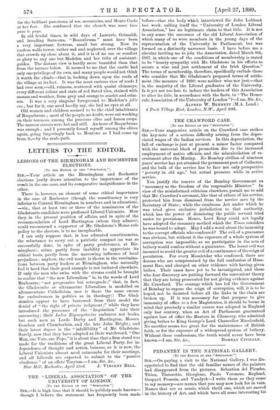THE CRAWFORD CASE.
[To THE EDITOR OF THE " SPECTATOR. "] SIR,—Yom• suggestive article on the Crawford case strikes the key-note of a serious difficulty arising from the depre- ciated wages of the Indian services. In this depreciation, the fall of exchange is just at present a minor factor compared with the universal block of promotion due to the increased employment of native officials, and the miscalculation of re- cruitment after the Mutiny. No Bombay civilian of nineteen years' service has yet attained the permanent post of Collector, and the bulk of the service has to face not only prospective " poverty in old age," but actual pressure while in active service.
You justify the reserve of the Bombay Government as " necessary to the freedom of the responsible Minister." In view of the misinformed criticism elsewhere, permit me to add that Mr. Crawford's covenant, like that of others of his service, protected him from dismissal from the service save by the Secretary of State ; while the cumbrous Act under which he was tried gives exclusive jurisdiction to that authority, which has the power of dismissing the public servant tried under its provisions. Hence, Lord Reay could not legally have adopted the summary method which the Times considers he was bound to adopt. May I add a word about the immunity to the corrupt officials who confessed P The evil of a guarantee was obvious, but without it the exposure of a whole system of corruption was impossible, as no participator in the acts of bribery would confess without a guarantee. The lesser evil was incurred to avoid the greater evil of a continuance of the reign of peculation. For every Mamletdar who confessed, there are dozens who are compromised by the full confession of Hum- munt Rao, and charged on other evidence with having given bribes. Their cases have yet to be investigated, and those who fear discovery are putting forward the convenient theory that they are being prosecuted for not giving evidence against Mr. Crawford. The courage which has led the Government of Bombay to expose the reign of corruption, will, it is to be hoped, not be daunted before all the links in the chain are broken up. If it was necessary for that purpose to give immunity of office to a few Magistrates, it should be borne in mind that precisely a similar course was adopted in England only last century, when an Act of Parliament guaranteed against loss of office the Masters in Chancery, who admitted giving bribes to King George's Lord Chancellor Macclesfield. No sacrifice seems too great for the maintenance of British faith, or for the exposure of a widespread system of bribery. Without these confessions, the truth would never have been


































 Previous page
Previous page